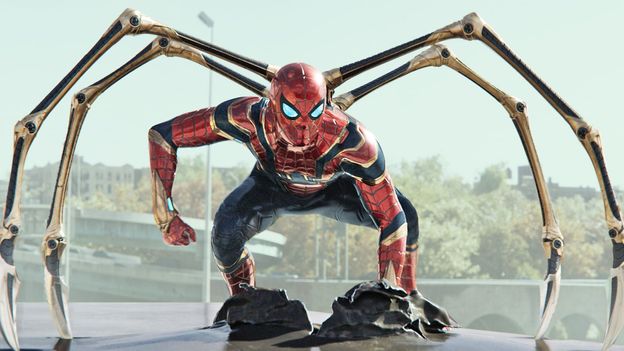Five stars for Spider-Man: No Way Home


Anyone who has glimpsed the trailers or publicity interviews will know that those people include the crazed Green Goblin (Willem Dafoe) from Raimi’s first Spider-Man film, the haughty Doctor Octopus (Alfred Molina) from his second, plus Electro (Jamie Foxx) from Webb’s The Amazing Spider-Man 2. They’re joined by some other characters, but I won’t spoil the fun by saying who they are. What I will reveal is the film’s most inspired twist. Doctor Strange wants to zap these interlopers back to the alternate realities where they belong, but Peter works out that in those realities, the supervillains will be killed in fights with Spider-Man. Rather than sending them to their deaths in another dimension, he insists on attempting to reform them. His mission, as he puts it, is not to “kick some ass”, but to “cure some ass”.
Of course, this is a disastrously foolhardy idea, but it makes a refreshing change from the mass-destruction schemes of most superhero films. And, in its noble naivety, Peter’s plan brings the story of Spider-Man back to the theme which defined the original comics: the sacrifices, painful consequences and great responsibilities that come with great power. If the last two Watts-Holland films leant too heavily on Peter’s relationships with such well-connected, jet-setting alpha males as Tony Stark and Nick Fury, this one remembers that he is essentially a scruffy, stressed New York kid who is trying to figure things out for himself.
It’s fair to say that Spider-Man: Into the Spider-Verse dealt with the concept of alternate universes even more brilliantly in 2018. It’s also true that if the most exciting part of No Way Home is the return of people who were in other films, then it falls short of the seminal Raimi-Maguire movies. But there is no denying the thrill of seeing so many of the series’ finest actors and most iconic characters together in one place. The filmmakers are careful not to overdo the winking postmodernism, too. Between their comic chemistry and their tragic flaws, there is something engagingly human about these superhumans.
The action sequences in No Way Home are fast and frenetic yet always coherent, and the post-Inception, city-twisting digital effects are spectacular. But the film’s real superpowers are its endearing performances, and a screenplay by Chris McKenna and Erik Sommers that interweaves teen-angst soap opera and cosmic calamity with all the goofy logic and tonal nimbleness that make the best superhero comics so appealing.
Besides, No Way Home isn’t just about looking back at old films. It also opens up new avenues for the Marvel Universe – or the Marvel Multiverse, to be more accurate. Until now, this hasn’t been the most successful year for the studio’s blockbusters. Black Widow, Shang-Chi and the Legend of The Ten Rings, and Eternals were all promisingly progressive on paper but underwhelming on screen. Collectively, they left me feeling that Marvel had run out of steam, at least as far as its cinematic ventures were concerned. But No Way Home left me eager to see where Spidey and Doctor Strange might go next – and that makes this Spider-Man one of the most amazing Spider-Mans of all.
★★★★★
Spider-Man: No Way Home is released today in the UK and on 17 December in the US.
Love film and TV? Join BBC Culture Film and TV Club on Facebook, a community for cinephiles all over the world.
If you would like to comment on this story or anything else you have seen on BBC Culture, head over to our Facebook page or message us on Twitter.
And if you liked this story, sign up for the weekly bbc.com features newsletter, called The Essential List. A handpicked selection of stories from BBC Future, Culture, Worklife and Travel, delivered to your inbox every Friday.








